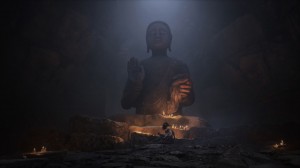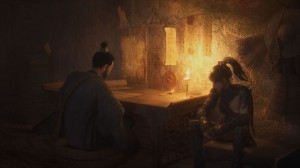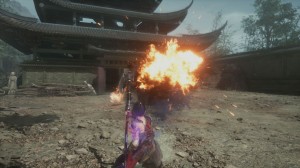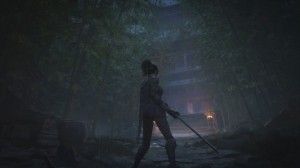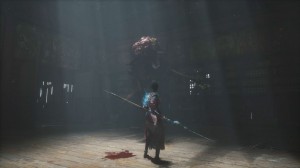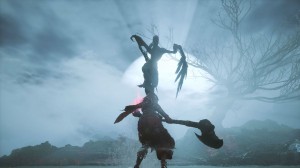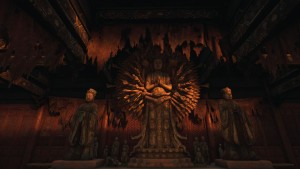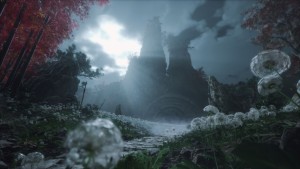WUCHANG: Fallen Feathers

by Samuel Corey
reviewed on PC
Wuchang: Fallen Dynasty
In the latest Chinese soulslike (which, between this AI Limit and Black Myth Wukong must be one of the most popular genres over there), you play as Wuchang, a sexy female pirate who has amnesia and is suffering from a magical illness that is slowly turning her into a bird. Initial press and some reviews have somewhat exaggerated Wuchang's sex appeal. She is, of course, a pretty Chinese lady with big tits and a nice ass, but most of her available outfits are not exactly titillating. The Ming Armor set, for instance, is a rather bulky suit of scale armor that covers every inch of Wuchang except for her face. Sure, you can dress Wuchang up in her underwear, but for every tactical bikini there is a perfectly practical suit of armor. This ain't exactly Stellar Blade.
The setting is semi-historical, being modeled after the series of crises that brought the Ming dynasty to an end. The central government still has some degree of control, but they are beset on all sides by plagues, famines, natural disasters, and rebel armies while being too mired in decadence to do much about any of them. If anything, the situation in Wuchang: Fallen Feathers is much worse than it was in reality, at least the Ming never had to contend with evil sorcerers, monstrous abominations, or trees that have become hostile after one too many corpses were discarded next to them.
Personally, I find the more grounded fantasy to be an enjoyable enough setting. It gives the game's designers the advantage of drawing from real history to fill out their world-building while giving them ample opportunity to work in the fantastic and the grotesque. The particular historical period chosen also lends itself nicely to the usual souls-like grim-dark atmosphere. This is, after all, a conflict that boasts a higher casualty figure than World War 1 (albeit over a significantly longer period). At times, though, the grimdark verges on grimderp, like when you walk past mounds of corpses in a populated city or military camp. Surely somebody would clean these up!
Dark Wuchang Souls
The original Dark Souls has, of course, contributed a lot to the mechanics and the tone of the souls-like genre. Oddly enough, though, nearly all of its successors have changed the fundamentals of combat, usually making them much, much faster than their progenitor. Indeed, even the game's direct sequel, Dark Souls 3, can boast much faster combat than the original. Wuchang, then, is somewhat unique in that it has relatively slow-paced combat, having much more in common with the original Dark Souls than its successors, to say nothing of games like Sekiro: Shadows Die Twice.
Still, it's not exactly the same thing. Wuchang doesn't have any options for shields, so you will have to rely on dodging and parrying if you don't want to get clobbered. It also gives every weapon a unique special ability that can be used in combat. The arsenal here is nowhere near the size of the one available in most souls-likes, but it makes up for it a bit by having every weapon feel unique with its own set of advantages and disadvantages. Though I'll confess that once I found the whip-sword that resembles Ivy's blade from Soul Caliber, I knew what my go-to was going to be.
The other welcome addition is how the game handles magic and special attacks. Rather than using a traditional mana bar that gets depleted as you use it, the game gives you mana when you manage a perfect dodge or land a combo on the enemy. So if you want to use magic or special attacks, you have to engage with the game's core combat system. It works similarly to the synchronization meter from AI Limit.
Depending on your tastes, the difficulty in this game will either be delightful or infuriating. It feels like Sen's Fortress stretched out into an entire game. Everywhere you go, there will be unseen traps and hazards waiting to catch you off guard. Sometimes this is just having an enemy hiding around a corner waiting to leap out at you if you charge in blindly. Other times, it's more literal traps with pressure plates that can trigger a volley of fiery arrows, or swinging pendulums waiting to knock you off a narrow causeway into a pit below.
That said, once you get used to the constant traps, the levels are pretty manageable in terms of difficulty. One can only blunder into a trap so many times until the lesson sinks in and you start taking your time and watching your step. The same cannot be said for the bosses, who remain an ordeal throughout, even if you have a lot of experience with souls-like games. Bosses will often have lengthy combos, limited windows of vulnerability, and punishing attacks that can drop you from a full health bar to nothing in short order. It's mostly tough but fair stuff here, though whenever I get knocked to the ground by the first hit in a boss' combo and stand up just in time to get hit by the next attack, it felt more than a little cruel. Far more enraging, though, is when the commute from the checkpoint to the boss is lengthy, like with the Perfect Bride: Fang Ling or the Mistress of The Night: Huang Yan boss fights that make you call an elevator, wait for it to arrive, and then ride said elevator down to the boss arena. Why isn't there just a checkpoint after the elevator?
As always, follow Hooked Gamers on Instagram for news updates, reviews, competitions and more.
9.0
fun score
Pros
Engrossing, slower-paced combat system reminiscent of Dark Souls 1, Intriguing, semi-historical but grotesque world, Some awesome boss fights
Cons
Some bosses feel unfairly difficult, Optimization issues
